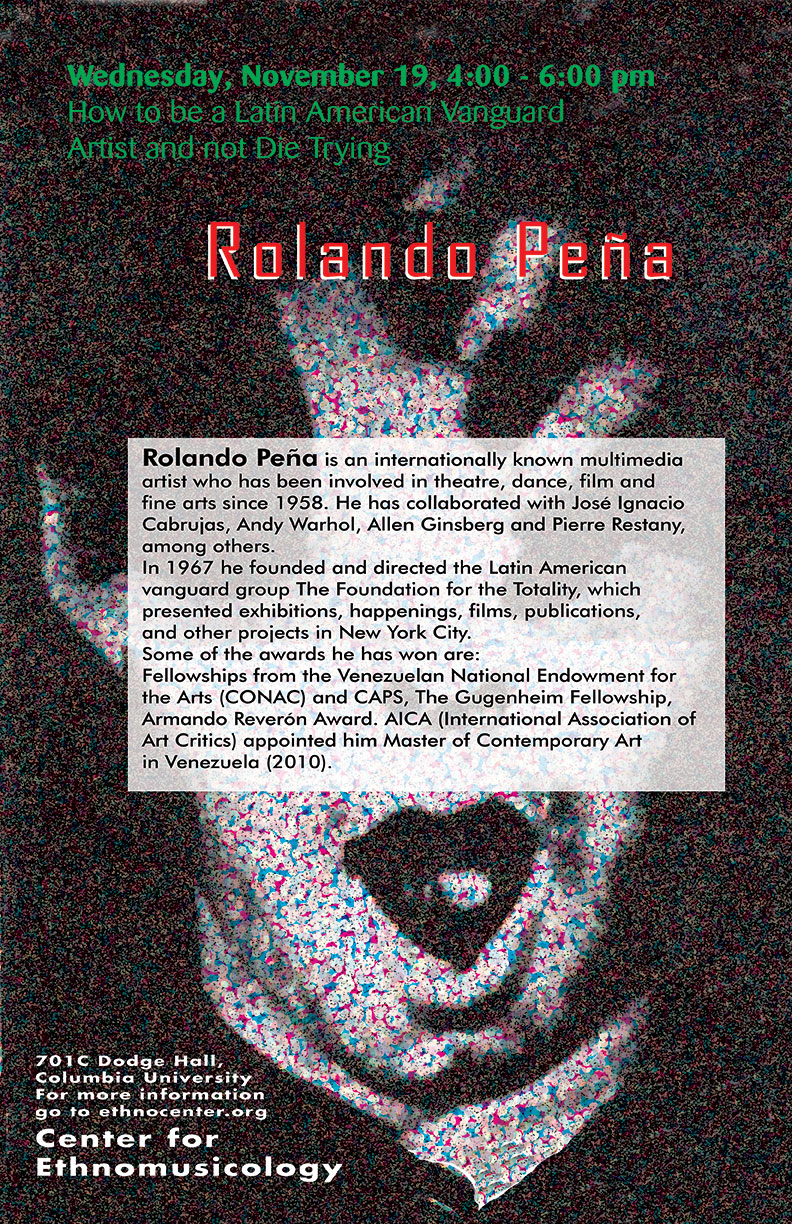Event Start:
Wednesday, November 19, 2014 - 4:37pm
Location:
701C Dodge Hall (Center for Ethnomusicology), Columbia U. Morningside Campus, Broadway @ 116th St.
 The Center for Ethnomusicology Presents:
The Center for Ethnomusicology Presents:
Rolando Peña
"How To Be A Latin American Vanguard Artist and Not Die Trying."
Wed. Nov. 19, 4pm-6pm
Center for Ethnomusicology
701C Dodge Hall
Columbia University Morningside Campus
116th and Broadway
Free and open to the public!
_______________
click image for full-sized poster!

Rolando Peña is an internationally known multimedia artist who has
been involved in theatre, dance, and fine arts since 1958. A student of
architecture and design at Universidad Central de Venezuela, he joined
the theater faculty of that university in 1963. In 1965 he staged the
pioneering multimedia shows Testimonio and Homenaje a Henry Miller with
the writer José Ignacio Cabrujas, which featured dance, theater, films,
slide projections, and other elements, the first such performances in
Caracas.
Supported by a grant from the Venezuelan government, he then moved to
New York City to study dance with Martha Graham, Alwin Nicolais, and
Merce Cunningham. He was quickly accepted by some of the iconic figures
of the day. In 1966 Allen Ginsburg and Timothy Leary joined him for the
psychedelic show The Illumination of the Buddha, and the following year
he founded and directed the Latin American vanguard group The Foundation
for the Totality, which presented exhibitions, happenings, films,
publications, and other projects. Soon he became involved with Andy
Warhol and his famous Factory: Warhol filmed many of The Foundation for
the Totality’s happenings, and Mr. Pena acted in some of Warhol’s films.
Rolando Peña’s own film Diálogo con Ché, which he scripted
and acted in and José Soltero directed and shot in New York, was invited
to the 1969 Cannes Film Festival, the Berlin Film Festival, and the
Cinémathèque Palais Chaillot in Paris. Moving back to multimedia, in
1975 he exhibited Santería at the Bogarin Workshop Gallery in New York,
and this same multimedia installation was the opening exhibit at the
Annex at the Contemporary Art Museum in Caracas.
But beginning in 1980 he found the theme that became the predominant
focus of his subsequent work: crude oil. Mr. Peña uses oil as an
expression both of Venezuela and of how Venezuela is perceived
internationally. By means of sculpture, graphics, film, and video, and
sometimes live performance, he examines the ideas of power, money, and
religion through the vehicle of oil and the machinery associated with
its extraction.
His initial exhibition on this theme was entitled The Oil Tower,
which was mounted in 1980 at the Alternative Museum. He was supported in
part during these early years by Fellowships from the Venezuelan
National Endowment for the Arts (CONAC) and CAPS in New York, and a
grant from the National Art Foundation in Venezuela (FUNDARTE). In 1997
he was chosen to represent Venezuela at the 47th Venice Biennial. His
project El Modelo Estándar de la Materia: Tributo al Siglo XX, an
interactive multimedia installation, was mounted in 1999 at the Sofía
Imber Contemporary Art Museum in Caracas. He presented many video
installations with oil as metaphor in the ensuing years, including The
Oil Spill, at the 2000 London Biennial; El Modelo Estándar de la
Materia, at ExpoHannover in 2000; Spontaneous Symmetry Breaking: God’s
Barrel, at Espacio de Arte Contemporáneo El Gallo in Salamanca in 2002,
which then travelled to the Instituto Italo Latino-Americano in Rome and
the Museo Pinacoteca Amedeo Modigliani in Follonica, Italy, and was
revived as a mural for the Andres Bello Catholic University in Caracas
in 2008.
Increasingly recognized as an important figure in the art world,
several tributes to his work were organized, such as at “Interarte 99”
in Valencia, Spain, in 1999; at Feria Internacional de Arte
Contemporáneo, at Mercado de Fuencarral in Madrid, organized by the
European Association of Young Artists, in 2000; and the lecture series
“Arte Ciencia y Tecnología, en la obra de Rolando Peña” presented at the
Andrés Bello Catholic University. In addition he served as a Professor
of Multimedia at the Ateneo de Caracas in 1972-73; as an invited
conferee at a conference on contemporary art at the University of St.
Denis in Paris in 1985; as a guest artist at the Instituto Venezolano de
Investigaciones from 1998 to 2001; as a guest lecturer at Andrés Bello
Catholic University from 1999 to 2007; and as the organizer of special
events for the Organización Nelson Garrido (ONG) in Caracas since 2001.
His knowledge of contemporary art has led to his curating several
international shows: Les Droits de l’Art at Chapelle de la Salpêtrière,
Paris (1989); Pierre Restany Le Coer et la Raison, at Morleix, France
(1991); V Muestra Internacional de Video, in Seville, Spain (1991); AU
DELA, Observatori 2001, at Segundo Festival Internacional de Arte, in
Valencia; and Performance Art (Dialogues-Performance) at ONG in 2007.
During his Guggenheim Fellowship term, Mr. Peña will be working on a
new interactive multimedia exhibition entitled Make Oil Green, which
adds the topic of global warming to his persistent interest in and
exploration of the theme of oil.